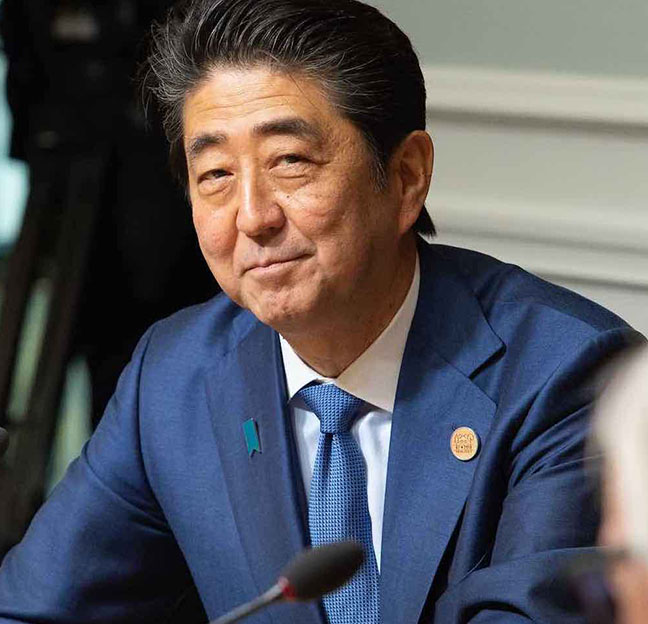The Chinese Embassy in Georgetown has voiced concern over a Project Syndicate column in Stabroek News authored by former Japanese Prime Minister Abe Shinzo in which he argues that American ambiguity over the defence of Taiwan must come to an end.
Abe, former Japanese PM between 2006-7 and 2012 to 2020, said that in response to Russia’s aggression against Ukraine, the US stated early on that it would not deploy its troops in Kyiv’s defence.
“But when it comes to Taiwan, the US has adopted a policy of strategic ambiguity… it remains unclear whether the US would intervene by force in a crisis involving Taiwan.
“Because the US prefers to leave undefined its position on how it would respond to an assault on Taiwan, China has (at least up to now) been discouraged from military adventurism. This is so because China’s rulers must account for the possibility that the US would indeed intervene militarily. At the same time, US ambiguity has forced Taiwan to consider the possibility that the US will not intervene militarily, and this has deterred radical pro-independence groups on the island.
“The US has maintained its Janus-faced policy for decades. But the third, most important difference between Ukraine and Taiwan suggests strongly that it is time for the US to reconsider its approach. Simply put, whereas Ukraine is an independent state beyond any doubt, Taiwan is not”, the former Japanese PM said.
He added “When Russia annexed Crimea, the international community ultimately acquiesced, even though Russia had violated Ukrainian sovereignty. Given this precedent, it is not surprising that Chinese leaders may very well expect the world to be more tolerant should they, too, adopt the logic of “regional” – rather than national – subjugation.
“This logic has made strategic ambiguity untenable. The policy of ambiguity worked extremely well as long as the US was strong enough to maintain it, and as long as China was far inferior to the US in military power. But those days are over. The US policy of ambiguity toward Taiwan is now fostering instability in the Indo-Pacific region, by encouraging China to underestimate US resolve, while making the government in Taipei unnecessarily anxious”.
The Chinese Embassy in a letter to the Sunday Stabroek labelled Abe’s statements as a vicious attempt to stir confrontation between major countries.
“There is but one China in the World and Taiwan is an inalienable part of China’s territory. The Taiwan question is entirely China’s internal affairs. The one-China principle is an internationally recognized basic norm governing international relations. The Taiwan question and the Ukraine issue are different in nature and are not comparable at all”, it said.
The Embassy cited China’s Foreign Ministry spokesperson Zhao Lijian responding on April 15 to Abe’s statement as follows: “(A) certain Japanese politician repeatedly makes wild talks on the Taiwan question and irresponsible remarks about China’s internal affairs, in a vicious attempt to instigate confrontation between major countries. China firmly rejects this.
“Taiwan is an inalienable part of China’s territory and the Taiwan question is entirely China’s internal affair. The Taiwan question and the Ukraine issue are different in nature and are not comparable at all. During its colonial rule over Taiwan for half a century, Japan committed innumerable crimes, over which it bears grave historical responsibilities to the Chinese people. The Japanese politician should speak and act with extra prudence on the Taiwan question and avoid sending any wrong signal to `Taiwan independence’ forces”.
The letter from the Chinese Embassy also noted that this year marks the 50th anniversary of the establishment of diplomatic ties between the People’s Republic of China and Guyana on the foundation of the one-China principle and added that the “Embassy expects the Stabroek News to shoulder its social responsibility and adhere to the one-China principle when selecting articles for publishing”.
In response, Stabroek News Editor-in-Chief Anand Persaud said that it was presumptuous and out of order for the Chinese Embassy to seek to influence what columns are published in this newspaper. Persaud said that the One-China policy was primarily a matter for pursuit by states and the newspaper’s overriding responsibility and obligation as part of the free press was to permit diverse opinions on all matters including Taiwan where elections are held periodically, an attribute much appreciated by democracies like Guyana which two years ago staved off an attempt to rig elections.





